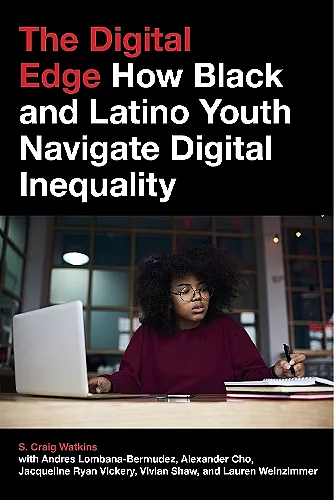The Digital Edge
How Black and Latino Youth Navigate Digital Inequality
Jacqueline Ryan Vickery author S Craig Watkins author Vivian Shaw author Alexander Cho author Andres Lombana-Bermudez author Lauren Weinzimmer author
Format:Hardback
Publisher:New York University Press
Published:11th Dec '18
Currently unavailable, and unfortunately no date known when it will be back
This hardback is available in another edition too:
- Paperback£23.99(9781479849857)

How black and Latino youth learn, create, and collaborate online
The Digital Edge examines how the digital and social-media lives of low-income youth, especially youth of color, have evolved amidst rapid social and technological change. While notions of the digital divide between the “technology rich” and the “technology poor” have largely focused on access to new media technologies, the contours of the digital divide have grown increasingly complex. Analyzing data from a year‐long ethnographic study at Freeway High School, the authors investigate how the digital media ecologies and practices of black and Latino youth have adapted as a result of the wider diffusion of the internet all around us--in homes, at school, and in the palm of our hands. Their eager adoption of different technologies forge new possibilities for learning and creating that recognize the collective power of youth: peer networks, inventive uses of technology, and impassioned interests that are remaking the digital world.
Relying on nearly three hundred in-depth interviews with students, teachers, and parents, and hundreds of hours of observation in technology classes and after school programs, The Digital Edge carefully documents some of the emergent challenges for creating a more equitable digital and educational future. Focusing on the complex interactions between race, class, gender, geography and social inequality, the book explores the educational perils and possibilities of the expansion of digital media into the lives and learning environments of low-income youth. Ultimately, the book addresses how schools can support the ability of students to develop the social, technological, and educational skills required to navigate twenty-first century life.
Based on an ethnographic study conducted in Austin, Texas, involving nearly 300 interviews, Watkins and his coauthors provide an overview of the digital divide that African Americans and Latino youth face and an exploration of the ways they use mobile technology and the internet.… The book’s strength lies in its asset-based framing of the potential and agency of adolescents who are eager to harness technology in their educations and careers. The book concludes by encouraging educators to ask if they are truly preparing youth for the future. -- CHOICE
A powerful dispatch from the front lines of the battle to ensure that digital education closesrather than widensgaps between communities of color and the rest of the nation. Digital Edge wrestles with the complex questions of whether the excitement Black Latino youth have expressed in adopting digital technologies can turn into economic opportunity, and whether our education system is capable of channeling that passion into educational equity. -- Ethan Zuckerman,author of Rewire: Digital Cosmopolitans in the Age of Connection
For anyone interested in an up-close observation of how black, Latinx, immigrant, and low-income students are participating in a complex digital world, I highly recommendThe Digital Edgefor its critical analysis of the complexities and tensions involved with technology in education, equity, and what it means to prepare all youth to be 'future ready'. -- Jane Margolis,author of Stuck in the Shallow End: Education, Race, And Computing
A major contribution in understanding the impact of precarious access to digital technology at school and home as well as missed opportunities for STEM education resulting in further widening the education and income gap, reproducing inequality for low income Black and Latinx youth, and severely impacting communities. * Social Forces *
The Digital Edge explains why what we believe about the digital divide is wrong, and in 2020, it could not be more relevant ... the authors presciently outline why it is time to rethink the old conception of the digital divide. This book is a must for educators, and an important read for anyone interested in the convoluted present and future of the digital divide in America. * International Journal of Communication *
ISBN: 9781479854110
Dimensions: unknown
Weight: 599g
304 pages